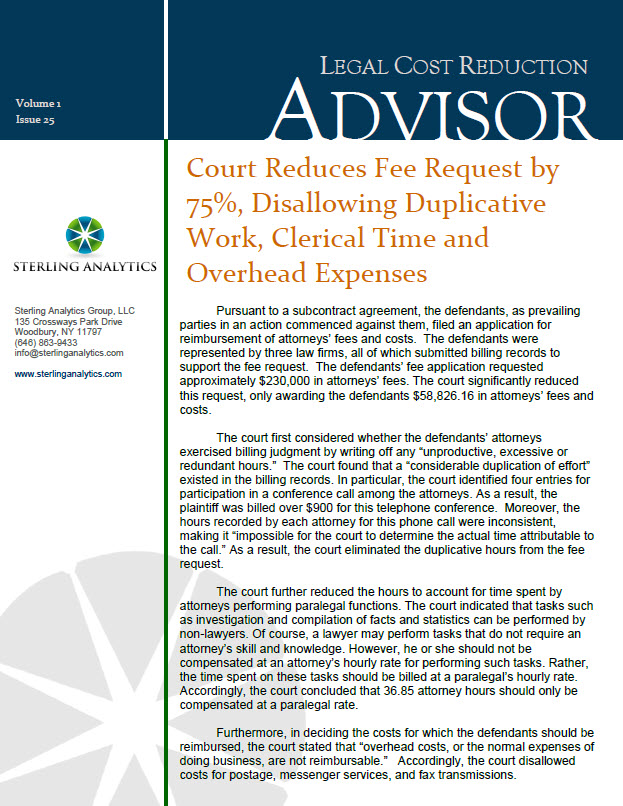Pursuant to a subcontract agreement, the defendants, as prevailing parties in an action commenced against them, filed an application for reimbursement of attorneys’ fees and costs. The defendants were represented by three law firms, all of which submitted billing records to support the fee request. The defendants’ fee application requested approximately $230,000 in attorneys’ fees. The court significantly reduced this request, only awarding the defendants $58,826.16 in attorneys’ fees and costs.
The court first considered whether the defendants’ attorneys exercised billing judgment by writing off any “unproductive, excessive or redundant hours.” The court found that a “considerable duplication of effort” existed in the billing records. In particular, the court identified four entries for participation in a conference call among the attorneys. As a result, the plaintiff was billed over $900 for this telephone conference. Moreover, the hours recorded by each attorney for this phone call were inconsistent, making it “impossible for the court to determine the actual time attributable to the call.” As a result, the court eliminated the duplicative hours from the fee request.
The court further reduced the hours to account for time spent by attorneys performing paralegal functions. The court indicated that tasks such as investigation and compilation of facts and statistics can be performed by non-lawyers. Of course, a lawyer may perform tasks that do not require an attorney’s skill and knowledge. However, he or she should not be compensated at an attorney’s hourly rate for performing such tasks. Rather, the time spent on these tasks should be billed at a paralegal’s hourly rate. Accordingly, the court concluded that 36.85 attorney hours should only be compensated at a paralegal rate.
Furthermore, in deciding the costs for which the defendants should be reimbursed, the court stated that “overhead costs, or the normal expenses of doing business, are not reimbursable.” Accordingly, the court disallowed costs for postage, messenger services, and fax transmissions.
Implications for Legal Billing: Where multiple attorneys work on a case, duplication of tasks must be prevented. Duplication can occur in instances where multiple attorneys work on the same task or, as this case demonstrates, where multiple attorneys attend the same meeting. If more than one attorney attends an interoffice meeting, only one attorney may bill the client for his or her time. The time spent by the other attorneys must be written off. To do otherwise demonstrates a lack of billing judgment.
Attorneys should also reduce hourly rates where time is spent performing non-legal work. It is inappropriate to charge an attorney’s hourly rate for a task that does not require an attorney’s skill. If the task is one which a paralegal would typically perform, it should be charged at a paralegal rate. This is true even where an attorney performs the work. As noted by the court, “the dollar value of work performed is not enhanced just because a lawyer does it.”
Moreover, an attorney should not be reimbursed for overhead expenses. As indicated above, overhead expenses include postage, messenger and fax transmission charges. These expenses are generally included in an attorney’s overhead cost. Therefore, an attorney is compensated for these costs through the hourly rate charged to the client.
*JGT v. Ashbritt, 2011 WL 1323410 (S.D. Miss. 2011). Full copies of court decisions may be available through counsel or through various Internet links or paid services.
By Laura R. Bugdin


